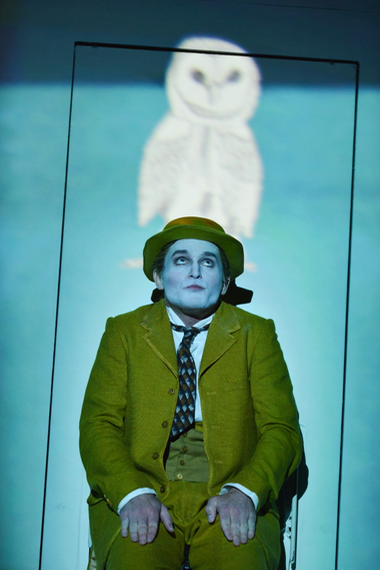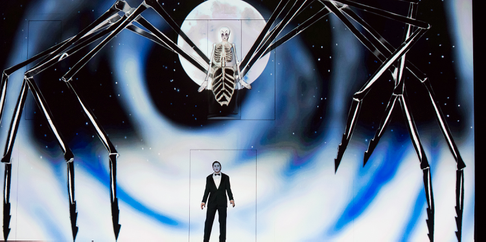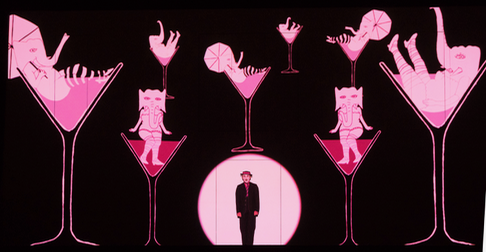
20 Sep 2017
Philly Flute’s Fast and Furious Frills
If you never thought opera could make your eyes cross with visual sensory over load, you never saw Opera Philadelphia’s razzle-dazzle The Magic Flute.
English Touring Opera are delighted to announce a season of lyric monodramas to tour nationally from October to December. The season features music for solo singer and piano by Argento, Britten, Tippett and Shostakovich with a bold and inventive approach to making opera during social distancing.
This tenth of ten Live from London concerts was in fact a recorded live performance from California. It was no less enjoyable for that, and it was also uplifting to learn that this wasn’t in fact the ‘last’ LfL event that we will be able to enjoy, courtesy of VOCES8 and their fellow vocal ensembles (more below …).
Ever since Wigmore Hall announced their superb series of autumn concerts, all streamed live and available free of charge, I’d been looking forward to this song recital by Ian Bostridge and Imogen Cooper.
The Sixteen continues its exploration of Henry Purcell’s Welcome Songs for Charles II. As with Robert King’s pioneering Purcell series begun over thirty years ago for Hyperion, Harry Christophers is recording two Welcome Songs per disc.
Although Stile Antico’s programme article for their Live from London recital introduced their selection from the many treasures of the English Renaissance in the context of the theological debates and upheavals of the Tudor and Elizabethan years, their performance was more evocative of private chamber music than of public liturgy.
In February this year, Albanian soprano Ermonela Jaho made a highly lauded debut recital at Wigmore Hall - a concert which both celebrated Opera Rara’s 50th anniversary and honoured the career of the Italian soprano Rosina Storchio (1872-1945), the star of verismo who created the title roles in Leoncavallo’s La bohème and Zazà, Mascagni’s Lodoletta and Puccini’s Madama Butterfly.
Evidently, face masks don’t stifle appreciative “Bravo!”s. And, reducing audience numbers doesn’t lower the volume of such acclamations. For, the audience at Wigmore Hall gave soprano Elizabeth Llewellyn and pianist Simon Lepper a greatly deserved warm reception and hearty response following this lunchtime recital of late-Romantic song.
Collapsology. Or, perhaps we should use the French word ‘Collapsologie’ because this is a transdisciplinary idea pretty much advocated by a series of French theorists - and apparently, mostly French theorists. It in essence focuses on the imminent collapse of modern society and all its layers - a series of escalating crises on a global scale: environmental, economic, geopolitical, governmental; the list is extensive.
For this week’s Live from London vocal recital we moved from the home of VOCES8, St Anne and St Agnes in the City of London, to Kings Place, where The Sixteen - who have been associate artists at the venue for some time - presented a programme of music and words bound together by the theme of ‘reflection’.
'Such is your divine Disposation that both you excellently understand, and royally entertaine the Exercise of Musicke.’
Amongst an avalanche of new Mahler recordings appearing at the moment (Das Lied von der Erde seems to be the most favoured, with three) this 1991 Mahler Second from the 2nd Kassel MahlerFest is one of the more interesting releases.
‘And there was war in heaven: Michael and his angels fought against the dragon; and the dragon fought and his angels, And prevailed not; neither was their place found any more in heaven … that old serpent … Satan, which deceiveth the whole world: he was cast out into the earth, and his angels were cast out with him.’
If there is one myth, it seems believed by some people today, that probably needs shattering it is that post-war recordings or performances of Wagner operas were always of exceptional quality. This 1949 Hamburg Tristan und Isolde is one of those recordings - though quite who is to blame for its many problems takes quite some unearthing.
There was never any doubt that the fifth of the twelve Met Stars Live in Concert broadcasts was going to be a palpably intense and vivid event, as well as a musically stunning and theatrically enervating experience.
‘Love’ was the theme for this Live from London performance by Apollo5. Given the complexity and diversity of that human emotion, and Apollo5’s reputation for versatility and diverse repertoire, ranging from Renaissance choral music to jazz, from contemporary classical works to popular song, it was no surprise that their programme spanned 500 years and several musical styles.
The Academy of St Martin in the Fields have titled their autumn series of eight concerts - which are taking place at 5pm and 7.30pm on two Saturdays each month at their home venue in Trafalgar Square, and being filmed for streaming the following Thursday - ‘re:connect’.
The London Symphony Orchestra opened their Autumn 2020 season with a homage to Oliver Knussen, who died at the age of 66 in July 2018. The programme traced a national musical lineage through the twentieth century, from Britten to Knussen, on to Mark-Anthony Turnage, and entwining the LSO and Rattle too.
With the Live from London digital vocal festival entering the second half of the series, the festival’s host, VOCES8, returned to their home at St Annes and St Agnes in the City of London to present a sequence of ‘Choral Dances’ - vocal music inspired by dance, embracing diverse genres from the Renaissance madrigal to swing jazz.
Just a few unison string wriggles from the opening of Mozart’s overture to Le nozze di Figaro are enough to make any opera-lover perch on the edge of their seat, in excited anticipation of the drama in music to come, so there could be no other curtain-raiser for this Gala Concert at the Royal Opera House, the latest instalment from ‘their House’ to ‘our houses’.
"Before the ending of the day, creator of all things, we pray that, with your accustomed mercy, you may watch over us."

If you never thought opera could make your eyes cross with visual sensory over load, you never saw Opera Philadelphia’s razzle-dazzle The Magic Flute.
The O17 festival has appropriated Barry Koskie’s acclaimed eye-popping production and cast it from strength with some of the finest young singers to be found on today’s opera stages. Mr. Koskie has co-directed with Suzanne Andrade and the pair has collaborated closely with the prodigiously gifted animator Paul Barritt to create a non-stop display of morphing projections that are both the production’s unique achievement and ultimately, its weakness.
Ben Bliss was a sweet-voiced Tamino, his pliant lyric tenor a perfect match for the Prince’s vocal demands. Mr. Bliss soared above the staff with an ingratiating ease of expression. Rachel Sterrenberg had a slower start as Pamina, her substantial soprano feeling its way through Bei Männern. As the show went on, Ms. Sterrenberg warmed to her task and settled in to provide a limpid, affecting Ach, ich fühl’s. In the final quartet Ben and Rachel’s intertwined lofty phrases fell quite wondrously on the ear.
 Queen of the Night and Tamino
Queen of the Night and Tamino
Jarrett Ott had all the wit and presence one could want in a Papageno, and you won’t often hear the role this well sung. Mr. Ott’s shining baritone has real star power and beauty. Olga Pudova was an audience favorite as a highly musical and secure Queen of the Night. Her pleasing tone and technical accomplishment made for two memorably accurate arias. Bass Peixin Chen did double duty as the Speaker (sung offstage) and Sarastro (sung mostly onstage). His weighty, orotund bass was darkly imposing, although it had a tendency to lumber a bit from note to note. Brenton Ryan’s well-projected, sizable tenor served Monostatos well, and his insinuating coloration of key phrases made for some inspired villainy.
The Three Ladies were a pleasantly compatible trio, with soprano Ashley Milanese a sprightly First Lady, mezzo Siena Miller holding her own in a solid turn as Second Lady, and mezzo Anastasiia Sidorova grounding the group with a firmly intoned Third Lady. The Three Spirits were a delight in their every appearance: AJ Owens, Damian Ferraro, and Patrick Corcoran were well schooled, pure-toned and cherubic. Ashley Robillard was such an appealingly pert soprano that she managed to score big as Papagena even though her role in this cutting was nearly non-existent.
The Armored Men are often cast with more mature singers so it was a pleasure to hear two fresh young vocalists bring brightness and poise to their ‘choral prelude’ and, especially, the quartet. Roy Hage (First Armored Man) sports an engaging, ringing tenor, and Marcus Deloach (Second Armored Man), serves up a vibrant baritone. Elizabeth Braden’s chorus was stirring in their brief, but important appearances.
In the pit, conductor David Charles Abell led an assured overture, in what would be the only visually unanimated music of the performance. Once the “fun” began, Maestro Abell did his considerable best to keep reminding us that the opera is really about sublime music and immortal characters, not just shock and awe video effects. He was sometimes stymied by the distraction. Perhaps owing to placement of singers, the ensembles (only) occasionally got ahead of the beat, with the Three Ladies being the most challenged in their tricky banter.
 Jarrett Ott as Papageno
Jarrett Ott as Papageno
This animated, manic concept seems to have given a good deal of pleasure to the vast number of audience members. It is certainly unlike any other. There is no doubt that the non-stop coordination of effects was a challenge, one that was always meticulously achieved. Papageno must siphon a pink lady out of a cocktail glass by “sucking on a straw” as it empties. Pamina must act threatened by a pack of snarling dogs that Monostatos has tethered, straining on a leash. Tamino must “pop” heart balloons floating above his head with his pointed index finger just at the right time. All tricky stuff, admirable to behold. But here’s the thing:
The characters were never allowed to interact with each other or, more critically, with the audience. They were mostly required to stand stock still in a prescribed spot, and everything happened to them or around them, but not with them. Do we really want the Queen of the Night vocalist to be reduced to a disembodied head while the animation attached to that head bombards us with an overused image of an attacking spider? There was so much cute commotion of appearing children during Papageno and Papagena’s duet that Mr. Ott and Ms. Robillard could have had a sparkler in their teeth and we would have been hard pressed to notice them.
Consequently, these appealing characters were never allowed to bond with each other or the audience. This was not like the integrated animation of say, Mary Poppins, where the imagery was a clever party trick that enhanced the live characters. In this Flute (which, by the way had no flute at all!), I had the feeling the whole shebang could have been animated with these wonderful singers in the pit without much change in the experience. For the record, Esther Bialas’ stage and costume design were manic and colorful; Christopher J. Hetherington’s lighting design complemented (read: stayed out of the way of) the projections; and David Zimmerman’s wig and make-up design provided fanciful whimsy.
With the dialogue completely eliminated and the plot advanced by projected blunt silent movie exclamations, the humanity of Mozart’s masterpiece seemed limited to the level of a complicated video game, albeit with superlative background music. Remember the music? Remember when The Magic Flute had, well, a magic flute? Me, too. . .
James Sohre
Cast and production information:
The Magic Flute
Music by Wolfgang Amadeus Mozart
Libretto by Emanuel Shikaneder
Tamino: Ben Bliss; Pamina: Rachel Sterrenberg; Queen of the Night: Olga Pudova; Sarastro/Speaker: Peixin Chen; Papageno: Jarrett Ott; Papagena: Ashley Robillard; Monostatos: Brenton Ryan; First Lady: Ashley Milanese; Second Lady: Siena Miller; Third Lady: Anastasiia Sidorova; First Armored Man: Roy Hage; Second Armored Man: Marcus Deloach; First Spirit: AJ Owens; Second Spirit: Damian Ferraro; Third Spirit: Patrick Corcoran; Conductor: David Charles Abell; Co-Directors: Suzanne Andrade and Barrie Kosky; Production: Suzanne Andrade and Barry Kosky; Animation: Paul Barritt; Stage and Costume Design: Esther Bialas; Lighting Design: Christopher J. Hetherington; Wig and Make-up Design: David Zimmerman; Stage Director: Tobias Ribitzki